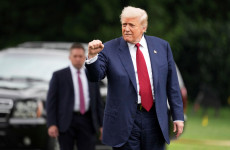Business
US Doubles Tariffs on Indian Goods to 50% Over Russian Oil Purchases

The United States has imposed a substantial tariff of 50% on numerous Indian goods, effectively doubling the existing duty. This decision, enacted by President Donald Trump, aims to penalize India for its continued purchases of Russian oil, which have garnered international scrutiny amid the ongoing conflict in Ukraine. The tariffs, one of the highest levied against any trading partner, are likely to further strain the already delicate relationship between Washington and New Delhi.
The move comes as Trump intensifies pressure on India regarding its energy transactions, which are seen as a significant revenue stream for Moscow. The tariffs could compel New Delhi to reassess its international alliances, particularly with Beijing. Since Trump resumed the presidency in January 2025, his administration has applied tariffs indiscriminately to both allies and adversaries alike, but the latest increase to 50% presents a particularly aggressive stance.
Despite this increase, certain sectors, including pharmaceuticals and computer chips, remain exempt from these tariffs. The administration has initiated investigations into additional sectors, which may result in further duties. Products such as smartphones, steel, aluminium, and automobiles have been spared from the new tariffs, highlighting a selective approach to trade penalties.
In 2024, the United States was India’s top export destination, with trade amounting to $87.3 billion. However, experts warn that a 50% tariff could effectively act as a trade embargo, significantly impacting smaller firms. Reports indicate that exporters in textiles, seafood, and jewellery have already begun experiencing order cancellations from US clients, leading to losses against competitors like Bangladesh and Vietnam. This situation raises concerns about potential job losses in affected industries.
In response to the tariffs, the Indian government has labeled the US action as “unfair, unjustified and unreasonable.” Prime Minister Narendra Modi has committed to mitigating the economic impact by pledging to reduce the tax burden on citizens in an upcoming address celebrating India’s independence. Modi has emphasized the importance of self-reliance and has vowed to protect national interests amidst growing international pressures.
India’s foreign ministry has previously indicated that its oil imports from Russia were initiated as traditional sources were redirected to Europe due to the ongoing conflict. Notably, the ministry pointed out that Washington had encouraged such imports to stabilize the global energy market at that time. By 2024, Russia constituted nearly 36% of India’s total crude oil imports, allowing the country to save billions on import costs while maintaining stable domestic fuel prices.
Despite these facts, the Trump administration remains steadfast in its tariff strategy. Peter Navarro, a trade advisor to Trump, remarked that “India doesn’t appear to want to recognize its role in the bloodshed,” suggesting a growing rift between the two nations. He accused India of aligning itself more closely with Chinese President Xi Jinping.
Commenting on the evolving trade dynamics, Wendy Cutler, senior vice president at the Asia Society Policy Institute, expressed concern that India has shifted from being a promising candidate for an early trade deal to facing some of the highest tariffs imposed by the US. She noted that while India has made strides in reforming its trade policies, the current high tariffs could jeopardize these advancements and erode trust between the two countries.
The Trump administration’s use of tariffs as a tool to address perceived unfair trade practices and imbalances has been a hallmark of its economic policy. In early August, a series of tariffs were implemented against various economies, including partners from the European Union to Indonesia. This latest round of tariffs on Indian goods follows similar measures imposed on Brazilian products, which surged to 50% this month, albeit with broader exemptions.
As the situation develops, both nations face a critical juncture in their trade relations, with potential ramifications extending beyond economic implications to geopolitical alignments in a rapidly changing global landscape.
-

 Top Stories2 months ago
Top Stories2 months agoTributes Surge for 9-Year-Old Leon Briody After Cancer Battle
-

 Entertainment3 months ago
Entertainment3 months agoAimee Osbourne Joins Family for Emotional Tribute to Ozzy
-

 Politics3 months ago
Politics3 months agoDanny Healy-Rae Considers Complaint After Altercation with Garda
-

 Top Stories3 months ago
Top Stories3 months agoIreland Enjoys Summer Heat as Hurricane Erin Approaches Atlantic
-

 World4 months ago
World4 months agoHawaii Commemorates 80 Years Since Hiroshima Bombing with Ceremony
-

 Top Stories2 months ago
Top Stories2 months agoNewcastle West Woman Patricia Foley Found Safe After Urgent Search
-

 Top Stories4 months ago
Top Stories4 months agoFianna Fáil TDs Urgently Consider Maire Geoghegan-Quinn for Presidency
-

 World4 months ago
World4 months agoGaza Aid Distribution Tragedy: 20 Killed Amid Ongoing Violence
-

 World4 months ago
World4 months agoCouple Convicted of Murdering Two-Year-Old Grandson in Wales
-

 Top Stories3 months ago
Top Stories3 months agoClimbing Errigal: A Must-Do Summer Adventure in Donegal
-

 World4 months ago
World4 months agoAristocrat Constance Marten and Partner Convicted of Infant Murder
-

 Top Stories3 months ago
Top Stories3 months agoHike Donegal’s Errigal Mountain NOW for Unforgettable Summer Views









